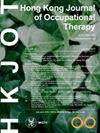手机应用程序的可用性,以提高乳腺癌幸存者在职业治疗服务中的日常生活活动
IF 0.8
4区 医学
Q4 REHABILITATION
引用次数: 0
摘要
背景/目的:越来越多的人利用康复新技术来评估和改善职业表现和生活质量。保健领域的技术应用可以帮助满足病人的需要,包括妇女乳腺癌幸存者的需要。本研究的主要目的是设计一个手机应用程序“MAIA”,专注于乳腺癌妇女的感知需求,以一种有意义的方式在日常生活中实现最佳表现。方法:采用在线问卷设计可用性横断面研究。收集社会人口学和职业表现数据。采用系统可用性量表、参与有意义活动量表、职业平衡问卷、一般自我效能量表、癌症治疗功能评估-手臂、肩膀和手的一般和残疾。描述性统计用于描述分类(频率和百分比)和定量变量(平均值和标准差)。结果:样本由78名被诊断患有乳腺癌的女性组成。超过20%的乳腺癌女性患者有九项日常生活活动受到影响。受影响最大的是睡眠、休息和功能活动。结论:乳腺癌女性幸存者在日常生活表现和参与方面存在困难。MAIA应用程序可以作为一种新的在线资源,用于乳腺癌幸存者的职业治疗康复。本文章由计算机程序翻译,如有差异,请以英文原文为准。
Usability of a mobile phone application to enhance activities of daily living in occupational therapy services for breast cancer survivors
Background/Objective: The use of new technologies in rehabilitation to evaluate and improve occupational performance and quality of life is increasing. Technological applications in the health field could help meet the needs of patients, including those of women breast cancer survivors. The main aim of this study was to design a mobile phone application “MAIA” focused on the perceived needs of women who have had breast cancer to achieve optimal performance in their daily lives in a meaningful way. Methods: A cross-sectional usability study using an online questionnaire was designed. Sociodemographic and occupational performance data were collected. System Usability Scale, Engagement in Meaningful Activities Survey, Occupational Balance Questionnaire, General Self-Efficacy Scale, Functional Assessment of Cancer Therapy - General and Disabilities of the Arm, Shoulder and Hand were administered. Descriptive statistics were used to describe categorical (frequencies and percentages) and quantitative variables (mean and standard deviation). Results: The sample was composed of seventy-eight women diagnosed with breast cancer. Nine activities of daily living were affected in more than 20% of women with breast cancer. The most affected were sleep and rest and functional mobility. Conclusions: Women survivors of breast cancer showed difficulties in daily life performance and participation. The MAIA App could be useful as a new online resource in occupational therapy for the rehabilitation of breast cancer survivors.
求助全文
通过发布文献求助,成功后即可免费获取论文全文。
去求助
来源期刊
CiteScore
1.10
自引率
0.00%
发文量
18
审稿时长
>12 weeks
期刊介绍:
The Hong Kong Journal of Occupational Therapy is the official peer-reviewed open access publication of the Hong Kong Occupational Therapy Association. The Journal aims to promote the development of theory and practice in occupational therapy (OT), and facilitate documentation and communication among educators, researchers and practitioners. It also works to advance availability, use, support and excellence of OT and maintain professional standards to promote better understanding of OT.

 求助内容:
求助内容: 应助结果提醒方式:
应助结果提醒方式:


